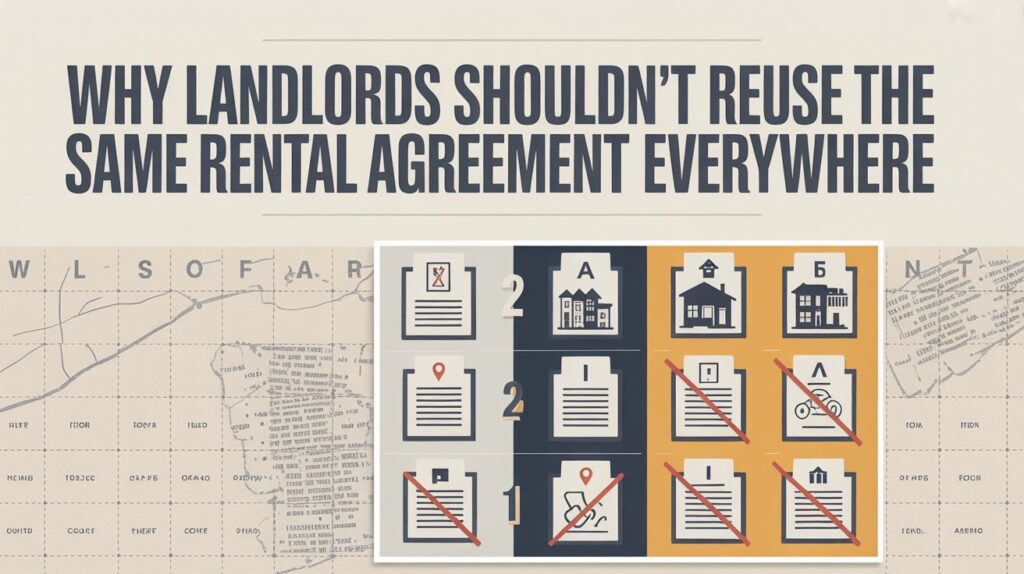If you have multiple rental properties, it’s tempting to use the same rental agreement every time. After all, if it works, it works – right? Except that’s not necessarily the best way to go about it. Every rental property is unique, and each jurisdiction, whether state, regional, or hyperlocal, will have different rules, regulations, and laws for landlords to navigate.
A one-size-fits-all approach just won’t cut it. Fortunately, you can find an excellent rent agreement form by state, which can help you get to grips with state laws, but it’s still important not to reuse the same generic agreement every time. Here’s why.
Changes to Laws
The law isn’t static – state, national, or regional laws can change surprisingly quickly, especially when it comes to rental laws like landlord-tenant laws, fair housing regulations, eviction procedures, and security deposit rules.
But it’s always important to understand that an agreement that was compliant two years ago could now include illegal clauses! You always need to know what disclosures need to be made by the landlord. This includes things like mold, bedbugs, or flood risks – some jurisdictions require different things, and the specific requirements are always subject to change.
Rent, security deposit rules, and eviction requirements must be completely correct. For example, Washington State introduced rent control measures in May 2025 older rental agreements will not reflect this and may violate the law.
Here are some examples of the kinds of law changes that could pose real problems for landlords reusing the same rental agreement everywhere:
- Eviction notices and notice periods: Changes to eviction notice laws and periods could mean your old agreements are completely unsuitable.
- Rent controls/caps on increases: Where there are rent controls or caps on increases, agreements that don’t reflect this may be invalid
- Different rules for certain types of tenants: Some vulnerable tenants (e.g., the elderly) in some jurisdictions may have additional rights unaccounted for by generic templates
Differences Between Jurisdictions
Even inside a single state, rental laws aren’t a one-size-fits-all scenario! Ordinances, regulations, and laws can vary from city to city, county to county. One city might have strict rent controls, while another has just-cause eviction protections.
By using the same rental agreement everywhere without any location-specific changes, landlords can expose themselves to large risks and inadvertently make violations. This can be even more dangerous when using the same rental agreement in multiple states.
Differences Between Properties
Every property is unique. While this can be very helpful in attracting tenants and providing unique benefits, it comes with its own problems – especially for rental agreements. When you reuse the same rental agreement everywhere, every time, you miss out on features unique to the property. And this can be very expensive from a landlord’s point of view.
If one property has a pool and another doesn’t, a generic agreement might not cover any pool-specific clauses! These are things like maintenance, cleaning, and liabilities that won’t be necessary in some properties but which are vital in others.
In a multi-household setting, failure to define shared laundry spaces, parking arrangements, or utilities can expose you to risks and cause costly disputes.
Tenant-Specific Agreements
You may find that some tenants require specific things that other tenants don’t need – or don’t ask for. While it’s totally fine to accommodate these requests, they should be included in the agreements.
If a tenant has permission for pets, for example, you would want to update their rental agreement to reflect that specifically. Not only do they get it in writing that they’re allowed to keep a pet at home, but you also get the opportunity to include clauses about maintenance, additional security deposits, and other pet-related potential expenses for your own protection.
Some tenants may require special permission to run a business from their property (always according to local laws and regulations), which should be reflected in their lease for their protection and yours.
Final Thoughts
When you have multiple properties, reusing the same rental agreement every time doesn’t just save time – it exposes you to unnecessary risks. When it comes down to it, the point of your rental agreement is to set out everyone’s rights and obligations in a fair, transparent, and legal manner. It’s not just an agreement – it’s a legal document designed to protect everyone it covers.
But it’s useless if its clauses are unenforceable. Some unenforceable clauses simply won’t stand up in court, e.g., clauses that state tenants must pay the landlord’s legal fees in every situation. Other clauses are illegal and will expose you to penalties, e.g., disallowing all children or refusing people based on race or religion.
When you reuse old agreements, you may miss law changes, tenant or property-specific information, or even fall foul of local laws that make your contracts unenforceable – or even illegal.

